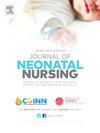不那么黄金的时间:一个案例研究
Q2 Nursing
引用次数: 0
摘要
出生后的第一个小时,即“黄金一小时”,是新生儿根据可改善预后的循证方案稳定下来的关键时期。然而,婴儿在此期间所经历的一些干预会引起压力和疼痛,并可能导致自主神经失调。对一名健康出生的中度早产婴儿的案例研究阐明了这一困境,并提供了基于循证婴儿和以家庭为中心的发育护理(IFCDC)实践的建议。本文章由计算机程序翻译,如有差异,请以英文原文为准。
The not-so-golden hour: A case study
The first hour after birth, the “Golden Hour”, is a critical period when the newborn infant is stabilised according to evidence-based protocols that improve outcomes. However, some of the interventions experienced by the infant during this period cause stress and pain and may themselves contribute to autonomic dysregulation. A case study of one moderately preterm infant born in a healthy condition illuminates this dilemma and proffers recommendations derived from evidence-based infant and family centred developmental care (IFCDC) practice.
求助全文
通过发布文献求助,成功后即可免费获取论文全文。
去求助
来源期刊

Journal of Neonatal Nursing
Nursing-Pediatrics
CiteScore
2.00
自引率
0.00%
发文量
143
期刊介绍:
Aims & Scope: This is the practical, bimonthly, research-based journal for all professionals concerned with the care of neonates and their families, both in hospital and the community. It aims to support the development of the essential practice, management, education and health promotion skills required by these professionals. The JNN will provide a forum for the exchange of ideas and information between the range of professionals working in this field; promote cooperation between these professionals; facilitate partnership care with families; provide information and informed opinion; promote innovation and change in the care of neonates and their families; and provide an education resource for this important rapidly developing field.
 求助内容:
求助内容: 应助结果提醒方式:
应助结果提醒方式:


